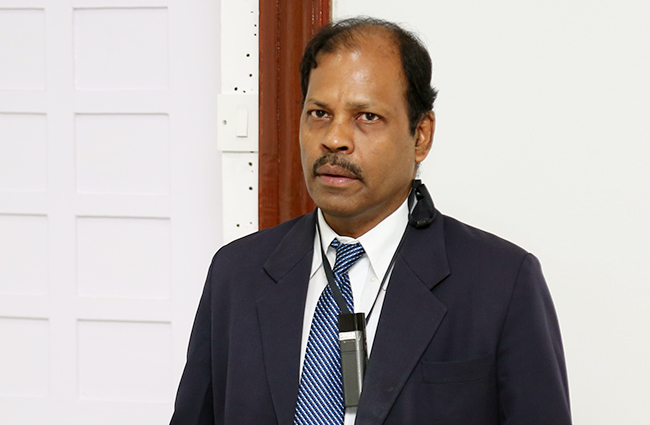
The Chief Secretary of Karnataka holds forth on skills necessary for public servants to create a strong and sustainable Public Policy system during the inauguration of the PGPPM batch of 2017-18 at IIMB
1 May 2017, Bengaluru: “In many a case, Public Policy is created as a knee-jerk reaction. The consequences of such policies are not thought out in advance and hence prove to be patchwork solutions. Actually, we need sustainable solutions, and hence should do proper analysis of policies, create robust systems and thereby prevent lot of disasters,” said Chief Guest Dr. Subhash Chandra Khuntia, Chief Secretary, Government of Karnataka, while delivering his keynote speech at the inauguration of IIM Bangalore’s Post Graduate Programme in Public Policy & Management (PGPPM) 2017-2018 batch today (Monday).
Dr. Chandra gave a detailed exposition of Public Policy and its usage across the world. Talking about the increased role of Public Policy in our country, he said: “Public Policy as a subject needs a lot of encouragement in a country like India where we are evolving policies constantly. As we are developing and aspirations are increasing in the democratic setup, new activities are getting added to the portfolio of the government. The scope of activities in the public space is increasing too. Poverty, malnutrition, health facilities, lack of clean drinking water, illiteracy, infrastructure – these are the areas that need a lot of focus. There is a lot of change in public administration in the country with various partnerships, like those with NGOs, PPPs, etc. Technology is changing too and we need to harness it for our advantage. However, new problems have cropped up due to technology which need to be mitigated. All these lead to a larger role of public servants.”
Dr. Khuntia listed important skills of public servants to create a strong and sustainable Public Policy system. “Governance systems need to be more effective and efficient. Also, Public Policy needs to be such that it gives maximum benefit to maximum numbers. If policy is aimed to serve a particular group, then it should be ensured that it is not disadvantageous to other groups. If not, then adequate steps should be taken to minimize such problems. Diverse interests should be converged to serve the larger public interest and the society as a whole. Wide-scale consultation should be at the heart of such Public Policy formulations.
“Flexibility is another important consideration in any Public Policy, to keep up with the changing environment. Also, Public Policy has to be cost effective. There should be a felt need for policies through public awareness and it should maintain balance. To manage political executives while framing Public Policy is another important skill of public servants. Moreover, a feedback loop has to be built to further improve policies that have already been formulated. It is also good to create transparency and good public debate, and involve as many people as possible. All these will avoid patchwork solutions in Public Policy,” he explained.
To the incoming PGPPM class, Dr. Khuntia said, “This course at IIMB will equip you with analytical powers, enable you to look at policies from the point of view of different stakeholders, and help you in formulating and implementing public policy in an analytical and objective manner.”
Earlier in the day, Prof. Gopal Naik, Dean, Faculty, IIMB, said: “The PGPPM was started with the objective to increase the capacity of the government, look at policy-related problems and find solutions for them through research. The programme also teaches the participants to address problems by using data. We have had more than 400 candidates graduating from the programme so far, and such professionals have benefitted both the central and the state governments. Graduates of this programme have contributed to the betterment of government working by bringing in innovative processes.”
Offering his best wishes to the new students, Prof. Naik said, “Our curriculum, data analysis technique and user-oriented methods will surely make your journey here at IIMB a rewarding one and enhance your knowledge.”
While welcoming the new batch, Prof G. Raghuram, Director, IIMB, said that the programme could be a transformational experience for them, covering myriad areas. “The important thing is to learn from the inputs from the faculty and use it in your own reflection. What I see happening in various domains of government is the issue of less government and more governance. Public Policy involves a bit of marketing also, hence understanding the client system for marketing is important”. He gave the example of the compulsory one-year rural stint for doctors and said the challenge is to incentivize the rural stint and motivate the doctors for national development. “How to evoke felt need, development of infrastructure, bringing in policy analysis systems, consideration for different stakeholders – these are other areas of development.”
Listing the pluses of being a student at IIM Bangalore, Prof. Raghuram said, “While you are here, you will realize that apart from faculty who will be associated with you, there is a much larger faculty base here. There are very many interesting projects going on at the institute associated with tele education, microfinance, mid-day meals, data analytics, health, etc. Faculty at IIMB is working across domains which are extremely relevant to public policy, so make the most of your time here with us.”
Visit @ IIM Bangalore
